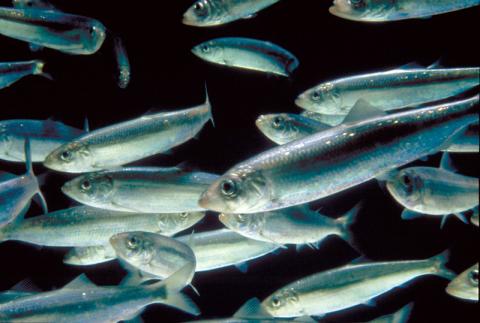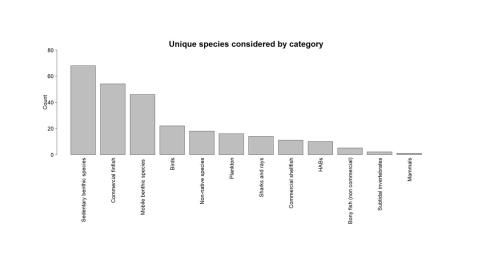To date, several valuable resources have been delivered through this Marine Warming Pathways project, including an inventory of UK marine climate models and ecosystem impact studies and an interactive web portal incorporating existing and new marine species projections for UK seas. Views on future evidence needs have also been gathered, with an indication of feasibility and importance of each provided, some key priorities identified, and a structured framework approach developed to address them.

A thorough review of publications on ‘future climate change impacts on marine species in UK seas’ undertaken in 2024 identified 44 relevant research articles. The articles included 497 attempted projections for 271 species or species groups. Beyond fishery and habitat forming species (e.g. kelps, biogenic reefs), models of projected climate-driven changes in marine species distributions are relatively sparse for UK seas.
The bar chart below shows the breakdown of species groupings with climate projections in UK seas by category of interest, undertaken in 2024. For consistency, one record per species is included within the appropriate group, despite several species being the focus of multiple studies.

A detailed inventory (updated in 2025 and with outputs from the project) can be accessed here, which lists the species studied (including individual entries where a species has been subject to multiple studies), and other key information such as timeframes and emission scenarios used.
Climate change models for UK seas are downscaled from global climate models using additional information about local processes. Leading research institutes were consulted throughout 2024 to compile a list of the latest UK marine climate change models that could be used to simulate future impacts on marine habitats and species.
They are summarised along with the key features for each model and compiled in this document.
Key features of these UK climate models are:
- The most recent and detailed UK marine climate models tend to use high emission scenarios (RCP8.5), and to a lesser extent, the moderate emissions scenario (RCP4.5). None of the models are based on a low (RCP2.6) emission scenario.
- Model outputs (e.g. for projected sea temperature increase) vary depending on the climate scenario; the underlying global model(s) used; the configuration of the local or downscaled simulations; and the ‘ensemble’ members used. The differences in outputs provided by the different models help to provide an indication of uncertainty.
- The climate models include a wide range of physical and biogeochemical variables (temperature, salinity, currents, phytoplankton and pH) for use in projecting ecosystem impacts.
- The spatial resolution of the UK specific models is typically 7-11 km2 and are subject to increased uncertainty around the coast and deeper ocean which is not well resolved by the models.
- The outputs are provided for a continuous period over the 21st Century.
To support decision-making, one set of model outputs for a wide range of commercial and vulnerable species in the UK are available in interactive apps. These tools provide maps of future projections of habitat suitability across UK seas for multiple time horizons and under different emission scenarios. The outputs use an ensemble of different ecosystem models, providing a useful measure of uncertainty in the model outputs.
The commercial species portal and the vulnerable species portal make these outputs publicly available, providing new opportunities for decision makers to access, and use the outputs, to inform decisions on the sustainable use of UK seas.
The outputs presented in the apps are included in the detailed inventory of future climate change impacts on marine species in UK seas alongside other additional analyses. Together these give a more complete understanding of the evidence available for species and ecosystems.
An approach to identify and meet evidence needs for UK marine ecosystem impacts under future climate change has been developed, to ensure that outputs relating to ecosystem impacts of climate change are appropriately defined and fit for purpose.
This evidence needs workflow enables data and evidence gaps to be identified for priority outputs.
The responses to a consultation to explore the current evidence needs and research priorities from a range of UK academic, policy and management stakeholders (2024-25) are collated here. The responses are aligned with policy and management themes. The issues highlighted through the consultation could be explored or interrogated further using the evidence needs workflow.
Additional project outputs are in development and will be shared soon. The outputs include future climate exploration of the thermal tolerance limits of a wide range of species including those in the upper and lower end of their range in UK waters.